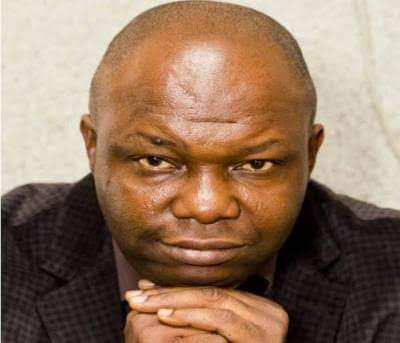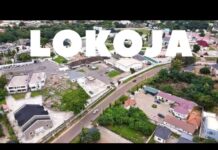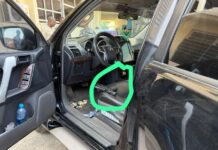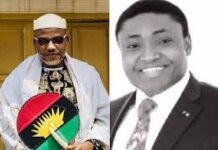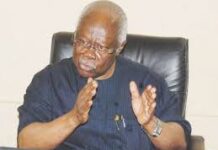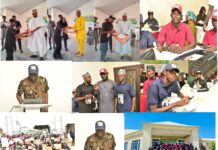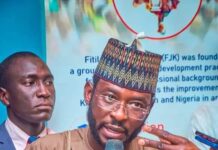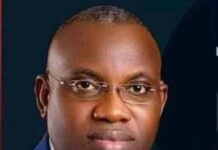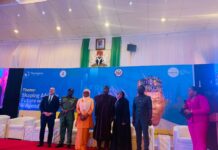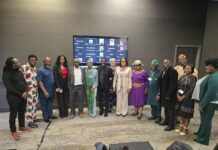One hundred minutes before Obasanjo
By Festus Adedayo
POLITICS DIGEST – Did I promise President Olusegun Obasanjo that there would be a ‘rematch’? I cannot precisely remember. But here we were, about 20 years after; he having left the office of the President of Nigeria, with his home at the Presidential Villa, Abuja and I, having left the Tribune newspaper, whose platform had brought me to interview him. We had met in 2001 or so at the Villa for the monthly programme of the office of the President called Presidential Media Chat, beamed live by the Nigerian Television Authority (NTA). Mr. John Momoh of Channels Television anchored the interview. Aside from me, other colleagues – Nkechi Nwankwo of the Champion newspaper and one other journalist from the New Nigerian – completed the interview ensemble. Obasanjo had been in office for barely a year or so and like the biblical Israelites who grumbled about their existential privations in the wilderness and salivated for their Egyptian past, Nigerians had begun to complain about his administration. Now seated before the No 1 Citizen of Nigeria, with the panoply of power and the majesty of office that he hung on his neck like a talismanic necklace, watched by millions of Nigerians, I felt it would be irresponsible of me not to let Obasanjo know about the dissenting murmurs of Nigerians on the streets, warts and all.
“Mr. President, perhaps because of my closeness to that specie of Nigerians called the Common Man and because of my closeness to him, which affords me the opportunity of being close to him, perhaps more than you, I hear his complaints every time. The common man is saying that the life he lived under the military was better than the life he lives now under your administration and in a democracy. Are you bothered, Mr. President?” I asked Obasanjo when it was my turn to fire a salvo of questions at him.
Before us, away from the camera of the NTA, was a coterie of aides who, from their remarks after the interview, didn’t take kindly to my seeming acidic jab at the President. I still remember Onyema Ugochukwu and late Mr. Tunji Oseni, his Chief Press Secretary among that crew. Mr. Oseni particularly believed that I must have been sent on an evil assignment to embarrass the president by his political traducers. Obasanjo himself found the question diffident and confrontational. His dilated as he answered it. In answering, the President began to catalogue all his achievements since inauguration in 1999 as the Nigerian president and ended with a phrasal riposte that still rings in my mind till this day, “don’t let us put words that did not say in the mouth of the common man.”
On Friday, April 16, 2021, an opportunity presented itself again to interview Obasanjo, now former President; this time in his house at the Presidential Boulevard, Abeokuta, Ogun State, on behalf of an international institute. The crew and I had arrived the house at about 9am.
Arresting, imposing but not vulgar, Obasanjo’s house will surely make you ponder on its aesthetics. The ambience of the Boulevard was mesmerizing and presidential. You would think you were in a mini-presidential villa. The environment was very serene as we drove into the boulevard, with rocks in about two spots in the surrounding as if they were artistic impressions. So also was a small stream on the way to the particular home where the former president lived. In driving, we drove past the Presidential Library and some other sections of the Boulevard. The home was indeed a city of its own. Soon, we were in the front of a three-storey building where the former president has made his home. Promptly, we were taken upstairs in an elevator.
The house where the twice Head of State of Nigeria lived, as said earlier, was humongous but didn’t reek of vulgar opulence. As if I was a scientist observing a queer object just fallen from Mars, I scanned Obasanjo’s living room with scientific scrutiny when we were eventually ushered in there. The walls were a screed with majesty that you could almost see yourself inside the mirror that it looked like. The floor, done in shining marble of black and grey, complemented the beauty. Nothing proclaimed the majesty of the house. Neat and orderly with an obsessive dosage of artistic carvings, you would wonder if you were in a traditional shrine. When you remember that it was during his time that Nigeria celebrated FESTAC ’77, you would then realize that Obasanjo was a great art lover and in love with African ornaments.
A stern-faced security operative, most likely an operative of the DSS, stood observing every movement round the living room. His scant staff of about four also moved round to perform their morning chores, courteous without being intrusive.
Perhaps to underscore his famed love of the traditional game of opon ayo, the former president had about three of them in the living room, uniquely done upon wood carvings. A particular one, which he seemed to use frequently, had his brown chair beside it and a similar brown seat for his player opponent. Standing and seemingly ministering to the players was another black wood carving of a woman with pointed breasts, a wrapper strapped round her waist. She carried an offering basket, libations if you like. Wherever you went in the house, there were hand sanitizers.
Indeed, on the table beside Obasanjo’s frequently used opon ayo were three sanitizer jars, a pack of serviette paper and a daily prayer book. Pictures of him, that of his wife, Bola and late wife, Stella, competed with the carvings, all of which were placed on the floor. A particular carving of all the three major Nigerian tribes competed with others. In it were an Igbo blowing a flute, a Yoruba drumming the bata and a Hausa blowing his horn. If time permitted, I muttered to myself, I would ask Obasanjo if he still believed in that nationalism of his of yore, judging by how Nigerian presidency had descended into the sewers of tribe and religion today.
We then moved into Obasanjo’s office for the interview. This was also a not too big space but beautiful. The former president seemed to be in love with the brown colour. Dominated by colour brown, the office walls were also a screed of orange and light orange colours, with brown floor tiles as well. In the office were three different writing tables and chairs, as well as a conference table with yellow coloured chairs and a couch.
On the conference table were books and papers. An imposing marble table stood jauntily in the office. My sparse French didn’t allow me take in what was written on it, which began with, Cadeau Offert A Son Excellence. I however was able to decode that the marble table was apparently given to Obasanjo by then Togolese President, Gnasingbe Eyadema, on September 8, 1978 during his official visit to Togo. In French was written that it had been presented to “Lt General Obasanjo.”
As if the litter of books was not enough. The office had a black book shelf, with neatly arranged books hidden inside its bosom. Books of different kinds like one entitled The Awo I knew, Ngugi wa Thiongo’s Wizard of the Crow, biographies of Lamidi Adedibu and Tony Blair, a book written on the Ibadan stormy petrel, Adegoke Adelabu, TD Jakes’ books, one entitled Life Overflowing and Segun Adeniyi’s book, Power, Politics and Death all lay inside the shelf. One thing of uniqueness was that there was a dosage of religious books therein as well, one of which was a Daily Guide. Jutting out from the orifice of the shelf was a small inscription with a biblical quotation from John 14: 1 and the word, Believe.
At about 9.50 am, the former president entered the office venue of the interview. He had aged a lot since I last met him about 20 years ago. Did I notice that he had shrunk too? His tribal marks also seemed to have disappeared. His gait was still soldierly. He wore a blue shirt and trousers, with the shirt having a red underground lining and brown pair of sandals, complemented by a blue Yoruba cap. He wore a white nose mask, apparently locally sown. A black pen jutted out of his chest pocket and a silver wristwatch dangled on his wrist. I did a mental calculation. Everything on the man nicknamed OBJ couldn’t be up to N15,0000. His slippers were locally made and when he sat to begin the interview and his trousers edged up, I scanned his legs, decorated with healed wounds on the tip of the trousers.
Knuckles greetings exchanged between the ex-President and the crew, he sat down to the interview. Obasanjo displayed a very sharp brain as usual, sauced with dosages of wits and a profound mastery of issues. His memory was wonderful, like an elephant’s. At some point, he used his right fingers to remove the nail on the left finger.
The interview proper then began. Unfortunately, the institute I represented made it known to me ab intio that the session was strictly scientific and not political nor even social. With this, I was constrained in asking the man nicknamed OBJ the questions that bothered me.
We were three on the interview belt; myself, a Kenyan colleague simply named Charity and another young lady called Dolapo. Charity was to conduct her belt of the interview virtually. When Obasanjo was told about the arrangement, he reminded the crew that he was an old man and his auditory appreciation was not as perfect as younger ones’. He then continued: “A friend of mine once said that old age is a disease. So I have got disease of old age. Although I am old, I am not ready for departure. They have bought me my ticket but I haven’t taken my boarding pass yet.” We were almost rolling on the ground with laughter. Charity didn’t get what Obasanjo meant and asked, “Are you planning to travel shortly, Your Excellency?” To this, Obasanjo replied: “Yes, I will travel to my Maker someday… I will not take the boarding pass yet. And you know that when they buy the ticket, I will collect the boarding pass… this will take some time. Then I get to the departure lounge and all that!
Obasanjo asked Charity how Kenya was doing but before she answered, he replied, “My two friends – Uhuru and Rahila are working together, which is very good.”
Questions then began to roll, the first being on Africa’s agricultural challenge, at a time of the COVID-19 pandemic. Obasanjo mesmerized everybody with his profound reply to the question. Though the pandemic had caught Africa unawares but the fact remains that, since food is essential to us on the continent, Africa must double its efforts to swim ashore. He was against asked what interweaving linkage does democracy and good governance have with agriculture. You would think Obasanjo was a professor in his delivery as he answered the question so eloquently. “There can be no substitute for good governance. If you look after the wellbeing of the people, you get the best out of them.”
Read Also:
What looked like a social question was the question posed to the former president to assess what had become of Nigeria since all the lofty policies Obasanjo put in place in his eight years of governance. As usual, he shoveled phlegm blocking his esophagus out of its hiding place and then began: “What you are asking me to do is to write a confidential report on my successors in government. That is not what I normally would have wanted to do but since you have asked me, I will try to do it in a way.” He spoke about how, when he came into government, Nigeria was in a very bad shape, economically and socially. He said many people came to him and told him matter-of-factly that the Nigerian situation was so bad that he would be the last president of Nigeria as after him, there would be no more Nigeria. He then promised them all that he would give leadership and give himself in totality to the task at hand.
The first thing he said he realized was that Nigeria needed a lot of reforms as no one can remain stagnant and make progress. He said he found out that Nigeria was heavily indebted and was spending about $3.5 billion to service her debt and yet, the quantum of debt was not going down. He then went on a debt relieve evangelism all over the world, to IMF, World Bank and others. Eventually, said Obasanjo, Nigeria got the debt relief, with almost $20 billion written off or given as relief. Nigeria then paid off about $12 billion, with her quantum of debt remaining only $3.6 billion, from about $36 billion.
“I remember my friend, the President of Algeria, came to me then and asked, how did you do it? I am also in debt. I told him to try his luck. He went round and didn’t get even a dime as debt relief. If that was done about 15 years ago and then today, we are in debt, more than when I was in government, I leave that judgment to anybody to say whether those who came into government after me did what is right or following the example that I laid or not.”
Obasanjo also gave the instance of cocoa production, which he said, when he took over, was 150,000 metric tones. There were nine states in Nigeria that were cocoa-producing states. He said he got them together to pay attention to the crop and with about $15 million from Cocoa Alliance when it was disbanded. That money, he said, was being deployed into frolicking all over the world by officials. He said he stopped the jamboree and deployed the money into revitalization of cocoa production. Thus, from 2003 to 2007, he said his government increased its production from 150,000 metric tones to 400,000 metric tons. Though he confessed that he couldn’t meet his projection of 1million metric tones, he wondered what sad state cocoa production was today. He said President John Kufour once jokingly told him to leave cocoa production for his country and concentrate on other areas and he also jokingly but blatantly refused.
Obasanjo also spoke of how salivated for service delivery in government immediately he got into office. According to him, he put a call through to Prime Minister Blair and asked for assistance. He inturn sent a lady in charge of the programme in his UK cabinet who set it up for Nigeria. “I don’t hear of anyone talking about service delivery any longer in Nigeria today. In fact, all that we set up has disappeared. So you asked, am I satisfied? No. How can I be satisfied when the bridge I constructed has either been removed or destroyed in most cases? In every human activities, leadership matters. I see this even in my own little agric-business.” Explaining, he said that when he was put in jail, when he was in government, which he called “the golden cage” and all the time he didn’t pay enough attention to it, his agric-business suffered.
Obasanjo also dovetailed into why he chose farming after leaving the Olympian height of a two-term Head of State of Nigeria. “”I was born in a village,” he began. “My parents never went to school. I was going to farm with my father and never went to school until I was nine years of age. Even with my joining the army and becoming the Head of State, the village didn’t go out of me. Though I was out of the village, I was at heart a rural and village boy, in spite of opportunities I have had to live in cities. Also, I left my career too early; I left the army at the age of 42, too young, too early and I left at the height of my military career. I couldn’t be going with brief cases to government offices asking what to supply. What was left to me was agriculture.” He said he took an agric-guaranteed loan of $1million by the Central Bank, which was almost equivalent to N2million at that time and went for three months training at the Moore Plantation – developed by the colonial lords in the south for research and training in agriculture, after leaving Dodan Barracks. He also said that he wrote the proposal for his loan in the school.
Obasanjo confessed however that by writing ‘Farming’ as his profession on his international passport, he nearly once got into problem in Canada when, at the Immigration, upon seeing his passport, they asked him to step aside for further interrogation. His friend who he had gone to see, who came in later, was to explain to him that farming was seen as a bottom of the ladder profession. For a farmer to radiate the luxury of travelling down to Canada to see his friend was queer to the Canadian immigration.
The interview went on and on, with Obasanjo demonstrating a quantum of mental energy that was baffling. I eavesdropped one of his staff saying that he had gone to play squash early in the morning and had also joined our Islamic brothers in this period of fasting.
For about one hour and forty minutes, the former President entertained questions that he never knew were coming to him and which he dissected with the scapular of a profound-minded man. His answers were sharp and accurate, a manifestation of his depth and we didn’t have to wonder longer where those books on his tables, shelf and virtually everywhere, were deployed.
As he spoke, I placed him side by side all the presidents after him, in terms of depth and commitment to the Nigerian nationhood and I shook my head. To place him side by side President Muhammadu Buhari, for instance, would be a criminal comparison. Whoever attempted it should be tied to the stakes and shot.
But why is Nigeria so blest, apologies to Ayi Kwei Armah, with a regression in the quality of leadership, since 1999? The most gratifying thing would have been for Nigeria to be able to boast of a leader after Obasanjo who was far deeper, far more cerebral and far more committed to the Nigerian nationhood template. In this regression, Obasanjo himself is culpable as he was instrumental to getting Nigeria the Buharis who have become gross affliction on the Nigerian state.
To demonstrate his energy, after the interview and Obasanjo was about to leave, he jumped up three times like a toddler and before we could recite Twinkle Twinkle Litter Stars, the man they nicknamed Ebora Owu had disappeared from view.
PECULIAR PATTERNS OF PATAMI’S BOKO HARAM TRAJECTORY
Minister of Communications and Digital Economy, Dr. Isa Ali Ibrahim Pantami, has been in the eye of the storm in the last few days. The major allegation against him was that he canvassed in recent past seismic views in support of his Islamic sect, said to be an extremist Salafist group and shared opinions on pulpits which suggested that he had affinity with and indeed, insurgency running in his blood. These, the allegation further claimed, were manifest in the extremist views Pantami held and the blatant hatred he had for people of other religions.
Pantami has however been struggling to disclaim the allegations. To buttress his declamation of the allegations, the Minister has been fighting frenetically to defend himself. For instance, though he admitted that he had been an Islamic preacher since age 13, he claimed that, in the last two decades, he had been invited and travelled to countries like Niger Republic, Katsina, Borno, and Gombe, among other northern states and his preaching was a singeing denouncement of Boko Haram’s ideology and Islamic fundamentalism. Unfortunately however, video evidence against him, especially as made available on YouTube and by the People’s Gazette, suggested contrarily. Pantami, in the videos being shared, was seen fraternizing with the destructive views of Bin Laden and justified the killing of kafirs.
Those who have attempted to exculpate the minister from the charge of sharing indecipherable opinions and ideology from insurgents’, as well as those who claimed that Pantami has since distanced himself from those views since he became minister, are spewing bunkum. First, what forensic sieve did they use to determine that he has been purged of such views? What assurance is there that someone who canvassed such demonic views isn’t a mole in government to the insurgents and is not funding these terrorist cells? While anyone can share or hold any seismic view that they subscribe to, whether religious or political and whether now or previously, so far as such view is not at variance with the laws of the land, they are in the clear. The state must however ensure that holders of such divisive views which contravene the secularity of the state must be held far off from the levers of power. That is the crime of the Nigerian state; allowing Pantami to rise to the level he has risen in Nigerian state affairs.
To be sure, Pantami’s religious views are not different from that of Sheikh Gumi, the man who has turned himself into the religious avatar whose chosen path is that of going inside the forest to mediate and negotiate between bandits and the Nigerian state. Gumi too has sought to canonize bandits and even insurgents by saying that Nigeria misunderstood them. He is free to trade such irresponsible views too. The problem will arise the day Gumi seeks to handle one of the instruments of administration of a secular Nigerian state.
That is why Pantami should not be blamed. The blame should fall squarely by the feet of President Muhammadu Buhari, his appointor, and the Nigerian state whose feeble binoculars could not pinpoint and pin those damaging and dangerous views ascribed to the Minister. Why I do not blame Buhari himself but the Nigerian electors who, in spite of them, voted him into office as president, is that, there seems not to be too much difference between the views held by Pantami and even Buhari himself before the latter became president. We were not too young to read and watch on television Buhari fuming and saying that if he was rigged out of the presidential election, the dogs and the baboons would be soaked in blood. That was an insurgent philosophy. This same man upbraided the Goodluck Jonathan government for attacking Boko Haram insurgents and said that every shelling of the insurgents was an attack against the north.
The truth is that, many northern elders unfortunately share huge slices of opinions that are similar to Pantami and Buharis’. It is why insurgency is festering in the land like ferns in a plantation. In a saner clime, Pantami would have resigned if he still retains any modicum of honour left in him. But, this is Nigeria; he won’t resign. Has President Buhari himself resigned?
Festus Adedayo is a Columnist with the Nigerian Tribune

